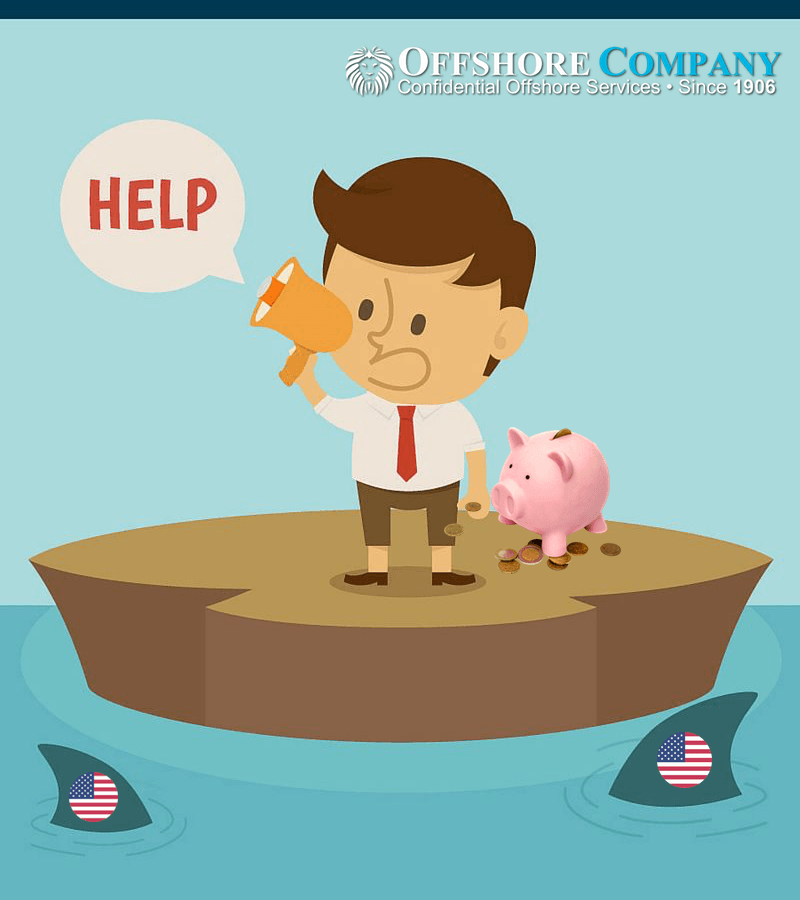Chapter 3

An International Bank Account is a bank account in a country other than the one in which you are a citizen. International banking, or an offshore bank account, commonly refers to accounts opened in financial havens such as one of the Caribbean islands, Cyprus, Luxembourg or Switzerland. The term offshore originated in Great Britain and originally referred to banks that were are not located there. According to Merriam-Webster’s dictionary, offshore means “situated or operating in a foreign country.”
Perhaps as much as 50 percent of global capital flows through offshore banks. These banking jurisdictions offer substantial privacy, stronger protective legislation and global availability of your deposits. People often use international banking for asset protection from lawsuits, when combined with an offshore trust or company.

Offshore Bank Account Opening
Opening an international bank account is not significantly different than it was opening your domestic account. You just need to provide a few more documents. You provide your personal information and identification, a reference or two and your opening deposit. When opening a bank account abroad, banks generally require a notarized copy of your passport. In addition, you will need a proof of residence, such as a utility bill, among a few other items. The items you need to provide depend on the institution’s requirements and local and international regulations.
An offshore bank may request reference documents from your present bank. If you already have a bank account at another bank, the international bank sees you as less of a risk. This requirement is generally satisfied by producing a reference letter from the bank you currently use.
In some circumstances, the offshore bank may want to verify the source of funds going into the account. They may take a look at the type of transactions you expect to employ. This is for the bank’s protection. The reason is that offshore banks are under considerable pressure to ensure they do not engage in illegal activities. Otherwise, they risk exposure to fines or loss of their banking license.
Proof of Source of Funds
If you are employed, a pay stub should prove satisfactory for fund verification. Money from real estate or business transactions may require proof of origin via contracts, closing documents and the like. A letter from an insurance company should suffice when depositing funds from an insurance contract. If the money is inherited, the executor or personal administrator of the estate can send a letter to the bank. The offshore bank may inquire about your investment income and where your investments are held.
The advantage of having Offshore Company establish your account is that we are eligible introducers. So, we can establish your account for you in many jurisdictions without you needing to travel abroad.

Offshore Banking Tips & Advantages
When you bank internationally you are taking advantage of various benefits of foreign jurisdictions. In some countries offshore banking privacy is taken so seriously, providing information to unauthorized parties is a crime for bank employees. An international bank account can be a great privacy tool. In order to maximize your financial privacy, you open the bank account in the name of an offshore company.
The tax benefits you enjoy depend on you country. US people, for example, are taxed on worldwide income. The UK, Canada and Australia tax its residents regardless of the location of the account. So it is important to follow the laws and obtain tax and legal advice.
Because operating costs are usually lower, offshore banks often give higher interest rates than domestic banks. Offshore banks can offer security if you live in a country with an unstable currency or political environment. If this is you, depositing your funds offshore is one of the best ways to safeguard your investment. Are concerned about a local judge freezing your bank accounts? That is usually very hard to do when your money is held in an offshore bank.
Many people have friends and relatives in foreign countries. Offshore accounts are also good places to hold money if you want to send funds to them. Perhaps a loved one living in another country left you an inheritance. If so, opening an account in that country is the simplest way to access your money. Do you travel a great deal to certain destinations overseas? You may want to avoid having to carry large amounts of money with you on the trip. As such, you can opt for a foreign bank account instead.

Why Open an Offshore Account?
International bank accounts held by offshore companies and/or trusts offer the most in personal asset protection. When your local courts say “hand over the money,” the offshore truste can refuse to comply. That is why the international bank account with an offshore asset protection trust is the most powerful combination.
Banking offshore is also a great way to participate in international investing opportunities. This organization opens bank accounts in all major international jurisdictions and acts as an eligible introducer to Switzerland’s strongest banks.
One of the strongest arguments for establishing an offshore bank account is diversification. A well-rounded portfolio often consists of stocks, bonds, real estate, precious metals and the like. That is, asset diversification increasingly means more than just putting your money in different asset classes. It also means geographic and geopolitical diversification, which you can achieve with an offshore bank account. Keep in mind the current US national debt is at all-time high, topping $22 trillion as of this writing. Those numbers mean even the US is vulnerable. The UK is £2.2 trillion ($8 trillion) in debt. France and Germany are over €4.5 trillion ($5 trillion) in debt.
So, having funds offshore is a way to provide yourself with greater financial security. If the finances of your country gets sucked down the rabbit hole of debt, you don’t want them to take you along. So, if you have funds in safer regions when financial collapse occurs domestically, you will be in much better shape than your neighbors. After all, the US has been downgraded by Standard & Poor’s because of its excessive debt. There are only 16 S&P AAA rated countries in the world. The US is not one of them.

Choosing Your Currency
Unlike most US accounts, an offshore bank allows you to choose between different currencies in which to hold your funds. Many investors prefer to hold assets in a variety of currencies. As a result, they are less affected if the dollar’s purchasing power declines.
However, while there are many advantages to choosing between various currencies, there are also drawbacks. You could end up owing foreign taxes on interest earned. If the country in whose currency you have invested experiences a recession, currency devaluation is possible. That means the value of the assets in your bank account could fall. There is always the possibility of regime change in a country, and the subsequent nationalization of banks.
The latter is unlikely in most countries. Keep in mind that many countries do not have the cybersecurity strength of the US. So, the odds of experiencing identity theft or similar cyber-crimes increases slightly. In addition, many countries do not have the same consumer protection laws as the US. Investigate the consumer protection laws of a nation before opening a foreign bank account. Better yet, contact an organization with experience on opening offshore accounts. Our organization is the largest worldwide on assisting people who need international bank accounts.
Changing one currency for another can often involve exchange fees. The exchange fees remains a constant factor in currency conversion. That is why most people who practice forex day trading as an investment strategy usually lose.

Get Professional Help
So, the reasons above strongly support why it so important to have professional help when opening an offshore bank account. Our professionals know which banks have treated our clients well. We know which bank will open accounts for people who reside in your country. Moreover, bank safety is a strong desire for our clients. So, we regularly research the solvency of the banks before we recommend them. In spite of this, not all banks end up as financial stallwards. As such, there are numbers above for you to discuss your needs with a professional. Alternatively, you can complete the free consultation form on this page.

Wire Transfers
You can fund your offshore bank account by sending a wire transfer from you domestic bank account to your offshore one. There is one small consideration to these transfer when made to an offshore bank, and that concerns the fees. Unlike wire transfers made between domestic banks, international wire transfers sometimes involves fees charged to the customer whether funds are sent or received. There is no standard fee, so potential international banking clients should look for institutions offering the best deals. Notably, offshore banks do not typically utilize checks (cheques). So, the best options are wire transfers.
Withdrawing funds from your offshore accounts is generally simpler. This is because your bank should provide you with an ATM or debit card. That way, your money is easily accessible worldwide. Now, these transactions are also subject to reasonable fees. Rarely, an offshore bank will offer checks, but this is not a suitable method of withdrawing funds for many clients. When an offshore bank issues checks to a client, the confidentiality diminishes. It is also difficult to cash a check drawn on a foreign bank domestically. Moreover, cashing such a check may require a long waiting period.
A good alternative is using two accounts, in a domestic and offshore bank, respectively. Via wire transfer, you can send money from your offshore account to your domestic bank. So obtaining your funds isn’t an issue. You still enjoy the privacy offered by your offshore bank account while taking advantage of the domestic bank’s convenience.

Local Taxes
When performing your research on offshore bank accounts, take local taxes into consideration. Most offshore banks that we utilize do not impose local taxes on foreign accounts, while others do. For example, if you hold an account in Switzerland in US dollars there are no taxes in Switzerland. If someone holds an account in Swiss Franc, the account holder pays Swiss taxes on those profits.
So, that could mean you end up paying taxes not only to your own country, but to the country in which you are banking. Typically, you get do deduct foreign taxes off of your domestic tax bill, so the effects are usually neutral.

Conclusion
An international bank account is one in a nation outside of the borders of your own country. Combined with an offshore asset protection trust it is one of the best ways to safeguard what is yours. Offshore banks protect their licenses by following the legally required know-your-customer regulations. This means you must provide the lawful documentation the bank requests.
Using the funds in your offshore account is as simple as swiping a debit card. Sending and receiving funds from your international bank account is as easy as doing a wire transfer.
Do you want to open an offshore bank account? If so, please make use of the phone numbers above. You can fill out a form on this page for more information as well, 24 hours per day.
| [1] | [2] | [3] | [4] | [5] | [6] | [7] | [8] | [9] | [10] | [11] | [12] | [Bonus] |



